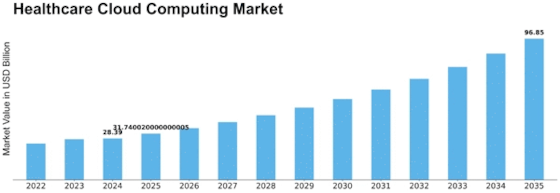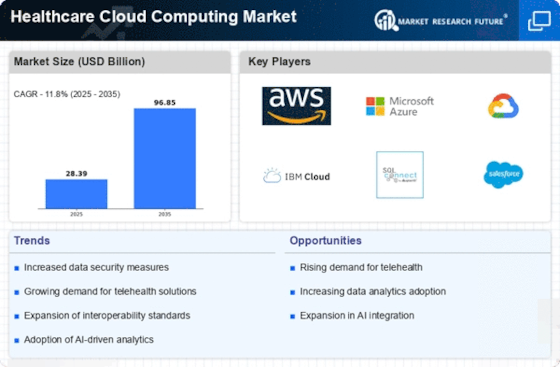Healthcare Cloud Computing Size
Healthcare Cloud Computing Market Growth Projections and Opportunities
The healthcare cloud computing market is recording high growth because of the rising demand for easy access to data. The cloud computing makes it possible for healthcare providers to store, manage and access patient data safely all the time regardless of their physical locations through improved collaboration and coordination in providing care. Cost-effective and scalable solutions related to cloud computing attract healthcare organizations. Cloud services do not require massive physical infrastructure, and thus providers only pay for the resources they utilize. This scalability is important in dealing with dynamic loads, resource efficiency as well as regulating operational costs. The growing trend in telemedicine services has contributed immensely the growth of the healthcare cloud computing market. Cloud infrastructure enables the management of huge medical data in real time, allowing for telehealth consultations and remote patient monitoring. This trend has been expedited by the global need for virtual medicine solutions, especially during world pandemics. The focus on keeping information about patients confidential arises from the sensitive nature of healthcare. Cloud computing vendors are spending a lot of money on comprehensive security provisions and certifications such as HIPAA (the Health Insurance Portability and Accounting Act) to accommodate healthcare standards that require stringent data confidentiality. The healthcare cloud computing market is driven by the increasing attention to interoperability and integration of health care systems. Cloud solutions provide easy communication between various healthcare applications and systems, which ensures the interchangeability of data that improves integrated health care. The adoption of cloud computing is being influenced by AI and ML applications used in healthcare. Cloud platforms offer the necessary computational power and storage needed for processing enormous datasets, allowing healthcare providers to benefit from AI-driven intelligence for diagnostics, predictive analytics. For healthcare organizations, cloud computing provides strong disaster recovery and business continuity plans. With data storage at secure off-site locations, there will be quick availability of recovered information during emergencies; this enables minimizing downtime and ensuring continuity in crucial healthcare services. Using the cloud platforms, real-time health data from these devices is readily collected and stored in a device that can be utilized by healthcare professionals to monitor patients remotely when necessary. Global healthcare organizations are implementing digital transformation programs, and cloud is a fundamental enabler of this revolution. This infrastructure is part of the tools which cloud solutions facilitate for easy adoption such as EHRs, telehealth services and other technologies that transform overall healthcare delivery. The market dynamics are shaped by intense competition among cloud computing vendors. Providers are continuously innovating to offer enhanced features, performance, and security. Healthcare organizations evaluate different vendors to choose solutions that align with their specific needs, compliance requirements, and budget constraints.



















Leave a Comment